This is Part 2 of my interview with Danielle Butcher Franz, the CEO of the American Conservation Coalition (ACC). In Part 1 we discussed her background, her views on the differences between liberals and conservatives regarding climate change, and the origins of the ACC. Here we discuss in more detail the theory of change of the ACC, how it is implementing it, its progress to date, and its plans for the future.
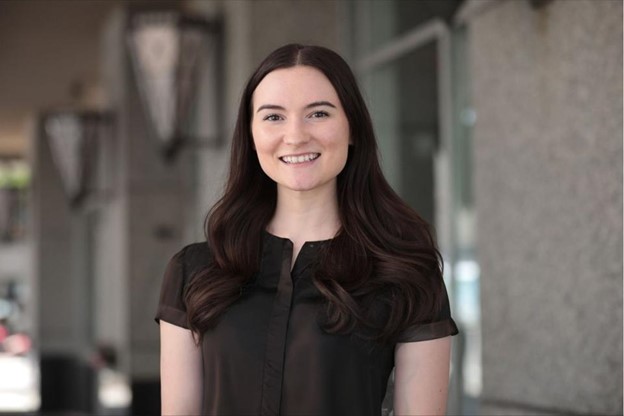
Danielle Butcher Franz, CEO of the American Conservation Coalition
Eccles: Thanks again, Danielle, for taking the time to talk with me. I’m sure that being the CEO of an NGO startup must keep you pretty busy!
Butcher Franz: Busy yes, but the good news is that it’s happy work! I appreciate the opportunity to share our mission, where would you like to start?
Eccles: I think a good place to start would be for you to talk about who’s the ACC’s base.
Butcher Franz: Our target audience is young conservatives and moderates between the ages of 18 and 35 who care about the environment and want to see a conservative alternative to the mainstream environmental movement. They think environmental issues are important, but they also want to see balance, led by a level-headed approach, not one defined by protesting or performative activism.
We see two distinct “types” of ACC members. One group is firmly politically conservative and wants to see their party grow and engage with environmental issues productively. These members are interested in more political opportunities. For instance, ACC Action, our sister organization that engages in political activity, worked with Dartmouth students to host conversations with presidential candidates ahead of the New Hampshire primary.
On the other hand, others are more outdoorsy and politically moderate. These members often lead ACC branches that focus on local community action, bridge-building work, and sustainability initiatives. For instance, ACC Ohio State hosts a thrift shop on campus to encourage a circular economy and discourage fast fashion practices.
Both of these groups of members are incredibly important to our mission. They both share our values and want to see our movement grow.
Eccles: You know this sounds very sensible and encouraging to me. You also know I’m spending time learning more about conservative groups like yours that are focused on the challenge of climate change. But I also have to be honest and tell you I don’t think Trump has been good for your party and he’s pretty much a climate change denier. Where do you think the GOP goes when Trump’s no longer around, however long that takes?
Butcher Franz: Trump’s rhetoric on these issues has been damaging to the growth of the party, no question. When it comes to climate change, my hope for the GOP is that we return to a “Big Tent” mentality. MAGA purity tests aren’t helpful and actually drive away people who may otherwise align with many conservative values.
Of course, there’s a lot of uncertainty right now in the middle of an election season. My hope for this movement at large is that we can address issues like climate change and conservation head on and be guided by conservative values, rather than running in the other direction.
Eccles: Glad to hear about your “Big Tent” mentality. I’m trying to encourage the same amongst my fellow liberals who are focused on climate change. The early returns on this are uncertain. Some are pleased I’m talking to conservatives; some are suspicious and beginning to wonder about me 🐥. What’s more important is that liberal experts on climate change start engaging with conservative experts on climate change. I’m no expert. I’m just trying to play a kind of broker role. But getting back to the ACC. What’s your theory of change?
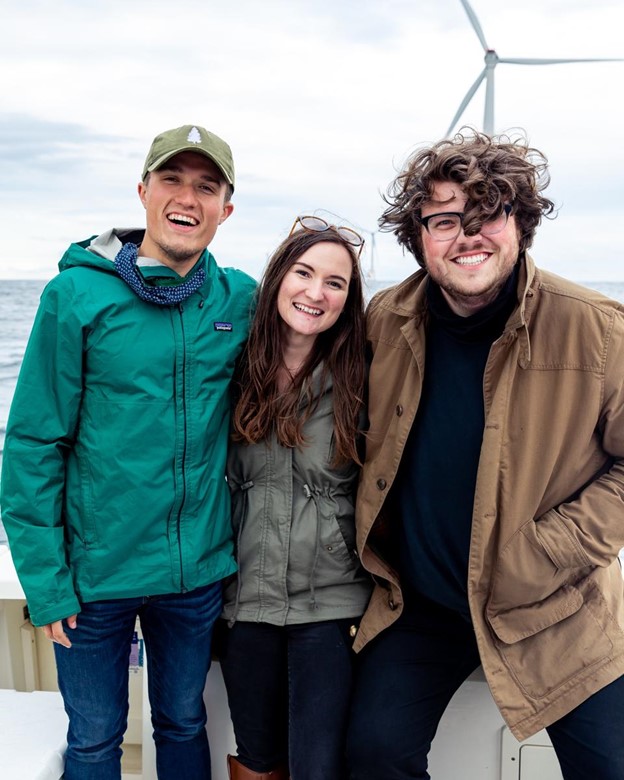
Benji Backer, Danielle Butcher Franz, and Tex Tischer (from left to right) tour Orsted’s Block island Wind Farm off the coast of Rhode Island
Butcher Franz: We see change as a cyclical process fueled by three key steps. First, we mobilize a grassroots base of advocates. We do this through our robust grassroots program, headed up by VP of Grassroots Lily Moll. We have four regional directors and several state directors who are actively recruiting new members and helping those members engage productively in the communities.
From there, we amplify those voices. Through events and media appearances, we continually demonstrate the size and volume of our movement in media outlets nationally and locally all across the country. Our movement has been featured on the likes of CNN, ABC News, and NPR, but also in more conservative outlets such as Fox News, The Daily Caller, National Review, and the American Conservative.
The last step here—but as I said, we’re talking about a cycle, so there’s really no “end”—is to use these advocates’ voices to influence decision-makers. Our “grasstops” operation in Washington D.C. does an incredible job of connecting our grassroots advocates to their Members of Congress to directly influence what happens in national environmental policy.
Eccles: Impressive! But since you are so well-connected in Congress, do you take positions on national legislation?
Butcher Franz: ACC is an educational nonprofit focused on promoting the values we use to approach environmentalism, but our sister organization, ACC Action, does engage in advocacy on specific pieces of legislation. ACC Action also endorses candidates and looks forward to announcing our full 2024 congressional endorsements later this year. For now, ACC Action is proud to support Rep. John Curtis in his Senate bid in Utah.
Eccles: As a Massachusetts Democrat I clearly have no voice in the matter on Mr. Curtis, but I’m impressed with his work and hope he wins! Next question. Which states does ACC engage in the most?
Butcher Franz: We are proud to have over 45,000 ACC members located in all of the 50 states, and we will help any ACC member start a branch no matter where they live. That said, we do have a few states that we have honed in on in recent years. Florida and Texas have been two of the biggest states for our movement. South Carolina, North Carolina, and Georgia also continue to be hotspots for our movement.
Eccles: Interesting and a bit surprising about Texas and Florida given that they have been especially loud in their anti-ESG rhetoric, legislation, and boycotting of asset managers What’s going on in the ground in these states?
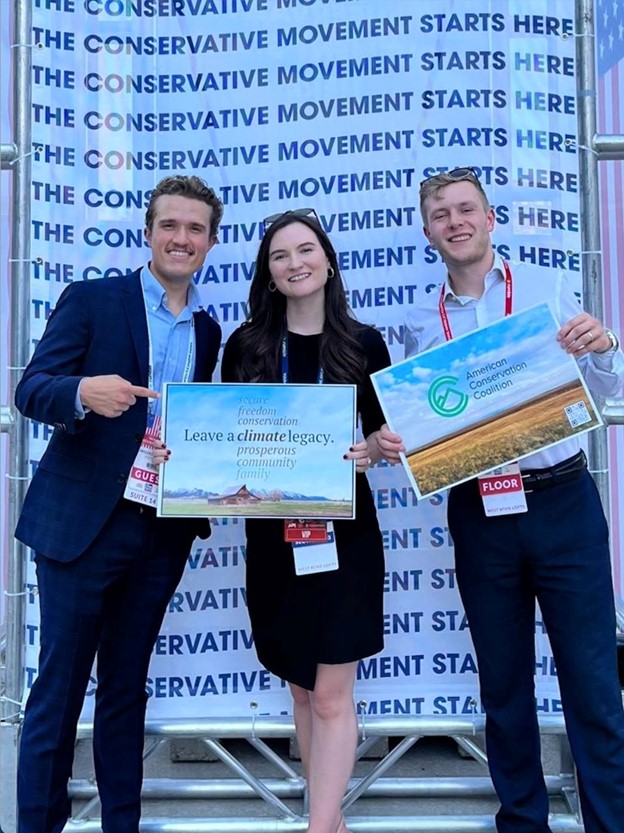
Benji Backer, Danielle Butcher Franz, and Chris Barnard (from left to right) at the first Republican Presidential Debate of 2024, where an ACC member posed a question on climate change to the candidates—the only audience question of the debate.
Butcher Franz: In Florida, the threat of climate change hits home, so we’ve found a lot of fertile ground for recruitment and action. Between sea level rise, increased extreme weather, and conservation challenges like toxic algae blooms, Florida’s tourism-driven economy faces a real challenge from the effects of climate change.
Texas is a model for an all-of-the-above energy approach, leading the nation in both oil & gas production, as well as wind energy production. We see the market as the real driver of this clean energy progress, and we’ve advocated for the continuation of Texas’s deregulated approach, even in the face of unproductive proposals from conservatives in the state. You can read more about this in The Daily Caller and The Dallas Morning News.
Eccles: This is encouraging to hear and confirms my view that climate change is less polarized than you’d think from reading the newspapers and that the anti-ESG campaign on the right lacks economic sense and will eventually run out of steam. Supporting the latter assertion, I’ve written about the great work being done by Centerline Liberties and eight other center-right taxpayer advocacy leaders have proposed seven free-market, pro-growth investment principles related to ESG.
But back to the ACC. What is the current size of the organization right now? Is there more capacity for conservatives on this issue now?
Butcher Franz: Currently, ACC has 25 full-time staff members, which is really incredible to be able to say when we started as a completely volunteer organization. We have over 45,000 members nationwide with more than 100 branches in communities and on campuses. We see an immense amount of growth potential still, and our goal is to reach 100,000 members by 2026.
Eccles: In our previous interview you said you engage with liberals as well as conservatives. What’s the mix there in allocating time?
Butcher Franz: Most of our time is spent equipping conservatives with the tools they need to engage on energy and environmental issues they care about because that’s really our value-add in this space. As conservatives ourselves, we know what resonates with traditionally conservative communities in a way that left-of-center environmental organizations simply do not.
That said, we do engage in some bridge-building work. For example, we just hosted a bipartisan youth climate advocate roundtable in Los Angeles where we convened conservative and progressive environmentalists to find common ground on permitting reform, environmental justice, and nuclear energy. We were even joined by former California Governor Arnold Schwarzenegger.
We talked about more red states where we have a significant base, but we’ve also made inroads in more purple states like Colorado.
Eccles: Since you’re talking to liberals, you’ll know that divesting from fossil fuels is a high priority for them. What’s your take on this highly contentious issue?
Butcher Franz: We do not advocate for divesting from fossil fuels. We’re an all-of-the-above energy organization, and we don’t see divestment from fossil fuels as a realistic path forward. It’s also incredibly divisive. In 2022, we found that only 2% of young GOP voters supported eliminating fossil fuels. There’s just no appetite there.
We think it’s counterproductive to shun the fossil fuel industry, and this is where many environmentalists go wrong. We want the industry involved in solutions, whether that be deploying carbon capture technologies, making progress on methane abatement, or investing in renewable energy simultaneously with their traditional energy operations.
Eccles: To the consternation of some of my liberal friends, as I’ve written with my Libertarian buddy John Skjervem, the CIO of Utah Retirement Systems, I’m in your camp on this. But, let’s face it, the left is just louder than the right when it comes to climate change. How do you get your voice out there?
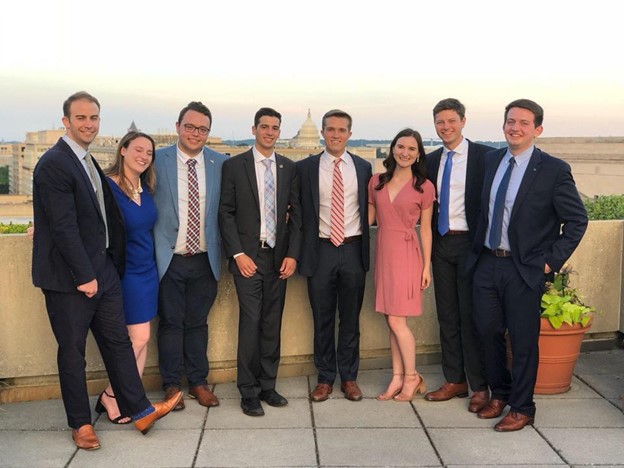
Early ACC team members, still entirely voluntary, pose after a team fly-in to Washington, D.C. in 2018
Butcher Franz: Just to level-set, we’re talking about a group of young conservatives who wanted to build a nonprofit for conservatives focused on environmental issues. For as long as we’ve existed our story has been an underdog story. Currently, the “Eco-Right,” as I’ve called it, is under-resourced, especially compared to the deep infrastructure that the progressive environmental movement has—whether that refers to funding, media influence, dominance of academia, or other factors. Our success is due to the sheer willpower and determination of our team and partners to get this message across to others, to recruit for our cause, and to offer an alternative. There’s no question that the eft is louder, but it shows just how needed our work really is.
Eccles: I couldn’t agree more about the need for a strong conservative voice on how to address the challenge of climate change and I’ve written about the good ideas I’ve learned from them. But don’t you think it matters that conservatives aren’t vocal on climate change or that it’s hard to find them?
Butcher Franz: Yes, it absolutely does matter. Conservatives need to know that they don’t have to compromise their values to lead on the environment. We have distinctly conservative solutions to offer, and we should proudly take our seat at the table. That’s why ACC’s messaging efforts are so important in turning the tide and making our way of thinking a part of mainstream culture. It needs to be widely accepted that conservatives can and do care about environmental issues like climate change.
Eccles: Again, I couldn’t agree more. I’ll also note that as your target audience gets older (we all do!) and come into greater positions of authority and influence the conservative voice will grow and that’s good. But let me ask you a rather delicate question. Have you ever had funders who don’t want to support you publicly even though they like you?
Butcher Franz: We work with people who are bought into the idea that we need a bona fide conservative environmental movement, and we’re not willing to undermine our conservative credentials by partnering with folks who aren’t bought in there.
At the end of the day, when we do agree, let’s work together. When we don’t agree, we don’t have to work together. There are times when perhaps collaboration across the aisle or across divisions isn’t a great fit, but that doesn’t mean there’s animosity or hostility.
Eccles: Very sensible. You’ve been very gracious with your time when I know you have a lot on your plate. Mind if I ask you one last question?
Butcher Franz: Go for it!
Eccles: Thanks! Where would you like to be five years from now?
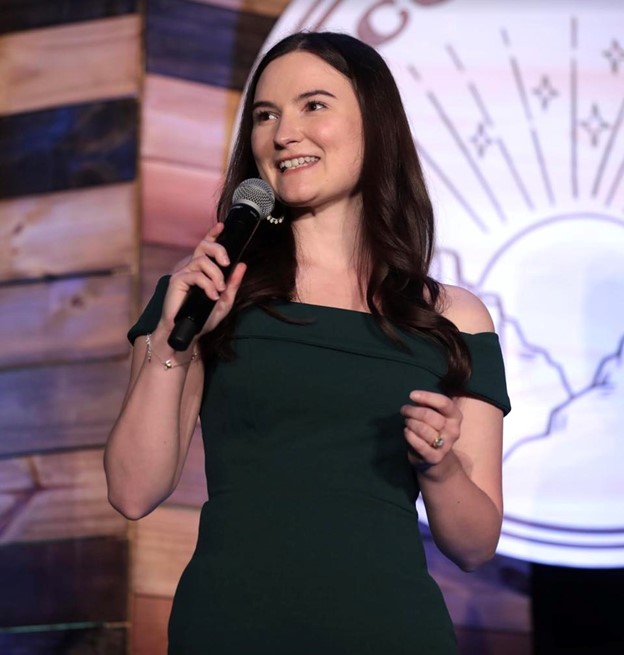
Danielle Butcher Franz addresses 300 ACC members at the 2023 ACC Summit in Salt Lake City
Butcher Franz: In five years, we will have significantly more than 100,000 members, or as we like to call that critical mass: an electorally significant base of young members. Additionally, we want to work with a legislatively significant bench of climate-minded Republicans in the House and Senate.
We’d also like to see the larger conservative movement buy-in on a conservative climate agenda. We see The Climate Commitment as that plan. The Climate Commitment is a framework for effective climate action guided by six “big ideas:” innovate, streamline, compete, unlock, conserve, and protect. These big ideas are the drivers for any effective climate policy. They are largely bipartisan, but The Climate Commitment demonstrates just how aligned these ideas are with conservative audiences.
Eccles: You and everyone on your team and partners are doing great work and I thank you for that. Best of luck and I hope we can keep in touch on your progress!
Butcher Franz: Thank you for your time as well, Bob. It’s been a pleasure speaking with you about ACC and our work. I’m glad to call you a friend from across the aisle!
SUBSCRIBE TO OUR NEWSLETTER
Subscribe our newsletter to receive the latest news, articles and exclusive podcasts every week

